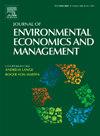Heat and experienced racial segregation
IF 5.9
3区 经济学
Q1 BUSINESS
Journal of Environmental Economics and Management
Pub Date : 2025-07-12
DOI:10.1016/j.jeem.2025.103210
引用次数: 0
Abstract
Racial segregation remains a persistent social challenge in cities worldwide. While public spaces promote diverse encounters, recent research suggests that extreme temperatures influence how much time individuals spend in these places. We evaluate whether such behavioral responses affect racial segregation, highlighting a previously unexplored channel between global warming and social welfare. Using mobile phone data on movement patterns to millions of locations in 315 US cities between 2018 and 2020, we estimate an index of experienced segregation in visits to different destinations between whites and other ethnic groups. We then exploit week-to-week variation in temperatures and the segregation index within cities to show that heat increases segregation, especially among individuals from lower-income areas and at places for leisure activities. A week with average maximum temperatures of 33 C in a city with moderate baseline segregation like Los Angeles moves the experienced segregation about 14 % closer to the level prevailing in the more segregated city of Atlanta. Climate projections demonstrate that mitigation policies can have significant co-benefits in cushioning future increases in racial segregation.
并经历了种族隔离
种族隔离仍然是世界各地城市持续存在的社会挑战。虽然公共空间促进了不同的相遇,但最近的研究表明,极端温度会影响人们在这些地方呆的时间。我们评估了这种行为反应是否会影响种族隔离,强调了全球变暖和社会福利之间以前未被探索的渠道。利用2018年至2020年期间美国315个城市数百万个地点的移动数据,我们估计了白人和其他种族群体在不同目的地旅行时经历的隔离指数。然后,我们利用城市内每周的温度变化和隔离指数来表明,高温加剧了隔离,特别是在低收入地区和休闲活动场所的个人之间。在洛杉矶这样一个有适度种族隔离基线的城市,一周的平均最高气温为33°C,这使经历过种族隔离的人更接近种族隔离程度更高的亚特兰大。气候预测表明,缓解政策在缓解未来种族隔离加剧方面可产生显著的协同效益。
本文章由计算机程序翻译,如有差异,请以英文原文为准。
求助全文
约1分钟内获得全文
求助全文
来源期刊
CiteScore
8.00
自引率
4.30%
发文量
91
期刊介绍:
The Journal of Environmental Economics and Management publishes theoretical and empirical papers devoted to specific natural resources and environmental issues. For consideration, papers should (1) contain a substantial element embodying the linkage between economic systems and environmental and natural resources systems or (2) be of substantial importance in understanding the management and/or social control of the economy in its relations with the natural environment. Although the general orientation of the journal is toward economics, interdisciplinary papers by researchers in other fields of interest to resource and environmental economists will be welcomed.

 求助内容:
求助内容: 应助结果提醒方式:
应助结果提醒方式:


